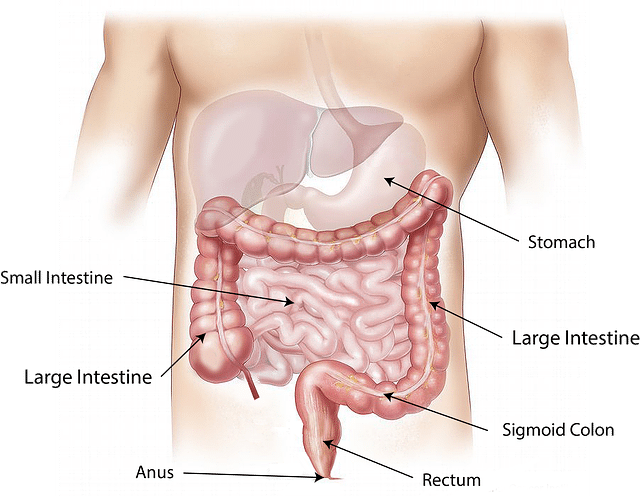The human gut is the largest endocrine system of the body that harbors over 100 trillion resident microorganisms. If unhealthy, a childhood diet can alter the gut’s microbial ecosystem for life; a new study in mice suggests that even having a healthier diet or exercise later would not help.
The human gut harbors highly diverse microorganisms, including bacteria, viruses, fungi, and protozoa collectively known as ‘gut microbiome’ that contribute to human health through the biosynthesis of vitamins, essential amino acids, and hormones and by absorbing the vast majority of nutrients and energy component.
The use of antibiotics, eating unhealthy food, or suffering from a chronic illness, disturb the gut ecosystem making the body susceptible to disease.
The number of microbial species in the human intestine is estimated to exceed 2000. They are approximately ten times as many microorganisms, around 100 trillion, as the number of somatic cells within the body (Conlon et al. 2014).

Not all microorganisms are beneficial, though. Along with the pathogenic organisms, the beneficial ones maintain a healthy relationship known as commensal with other body systems.
Though genetics play a significant role in maintaining the commensal, other factors, such as the use of antibiotics, eating unhealthy food, or suffering from a chronic illness, disturb the gut ecosystem making the body susceptible to disease.
Over the decade, gut health has been an essential topic of health research, particularly on a diet-modulating gut microbiome, exploring how dietary choices impact human health by altering the gastrointestinal commensal (Singh et al. 2017).

Supplement Boosts Muscle, Mitochondria Health

Calorie Restriction Linked with Low Body Temperature, Health Benefits
In a recent study, scientists at the University of California, Riverside (UC-R) examined the effect of an energy-dense Western diet, usually characterized by high in fat, sugar, and low fiber, fruits, and vegetables, on the changes in the gut microbiome in mature mice fed an unhealthy western diet as a juvenile. The study found that eating fat and sugar as a child can alter the microbiome for life, even if dietary patterns change later.
The study results were published in the Journal of Experimental Biology on 11th January 2021 (McNamara et al. 2021).
In the study, the researchers used mice as experimental animals. They divided the mice into several groups, including one control given a regular diet and two treatment groups: one given a healthy diet and the other fed a Western diet.

After three weeks of dietary intervention, all mice were returned to standard living conditions, including diet and exercise, at which they are usually kept in a laboratory until 14 weeks of age. Then, after collecting fecal samples, the researchers examined the diversity and abundance of microorganisms in the animals.
They found that the juvenile Western diet reduced bacterial richness and diversity after the 8-week washout period (equivalent to ∼6 human years). The quantity of Muribaculum intestinale, which is involved in carbohydrate metabolism, was significantly reduced.
The analysis also showed exercise played a significant role in the growth of bacteria. The number of Muribaculum bacteria increased in mice fed a standard diet with access to exercise and decreased in mice on a high-fat diet whether they had exercise or not (Bernstein 2021).
The UCR researchers found that an early-life Western diet had more long-lasting effects on the microbiome than early-life exercise. “These results constitute one of the first reports of juvenile diet having long-lasting effects on the adult microbiome after a substantial washout period. Moreover, we found interactive effects of a diet with early-life exercise exposure, and a dependence of these effects on genetic background”—the study concluded.





















Many thanks for this article. I would also like to talk about the fact that it can often be hard if you find yourself in school and just starting out to initiate a long credit standing. There are many pupils who are merely trying to pull through and have a long or good credit history can often be a difficult element to have. Henka Derby Mikaela
Very great post. I just stumbled upon your weblog and wanted to say that I have truly loved browsing your blog posts.
Good post indeed. Love to see more articles like this.
Very interesting post. Keep posting more articles like this.
Thank you very much for this information.
Keep posting on social media. One way to popularize the post. Good luck.
Many thanks for the article. Would love to see more article like this. Keep posting.
Many Thanks
ok
Thank you
Thank you.
It is best to take part in a contest for the most effective blogs on the web. I will recommend this site!
I wish to apprentice while you amend your website, how could i subscribe for a blog site?
I am not sure how to contribute to your site, a great topic. I need to spend some time learning more or understanding more. Thanks for the excellent info I was looking for this information for my mission.